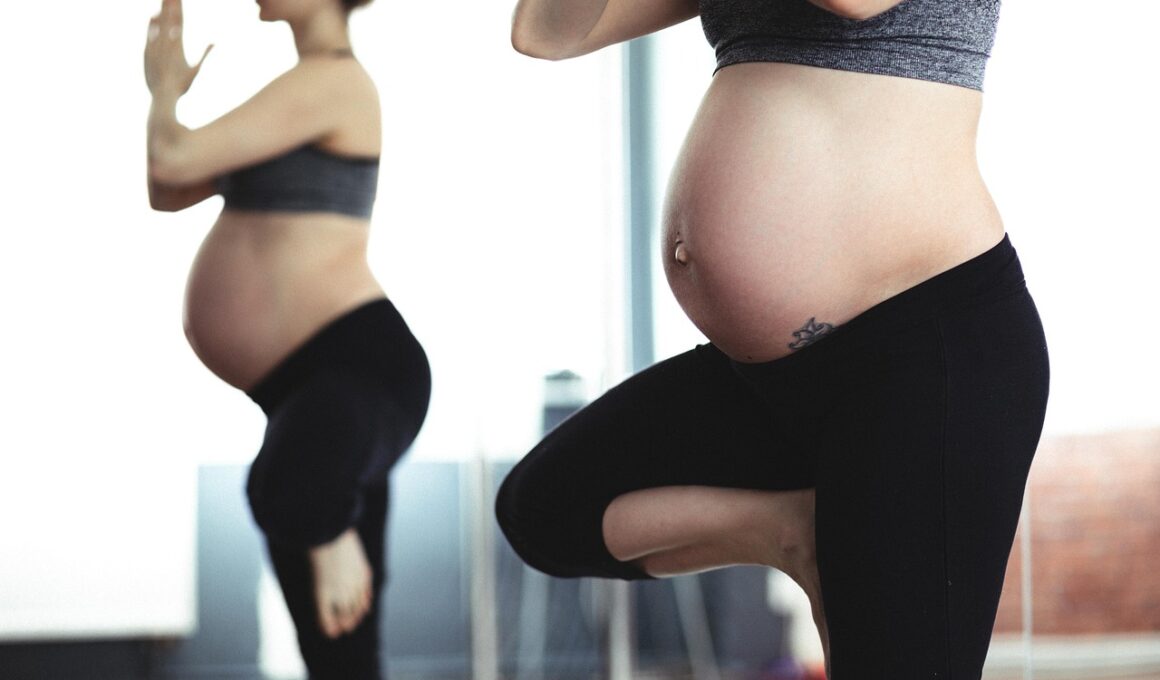Is It Normal to Experience Fatigue During Prenatal Workouts?
Fatigue during prenatal workouts is a common experience for many expecting mothers. As your body undergoes numerous changes, energy levels may vary significantly. This is often due to the physical demands of pregnancy, including hormonal shifts and the growing fetus. It’s essential to listen to your body and adjust workout intensity accordingly. Taking breaks and modifying exercises can help manage fatigue levels effectively. Staying hydrated and well-nourished is vital. Ensuring you consume enough calories and stay hydrated can also combat exhaustion. Understanding your limits is crucial; however, some fatigue may be indicative of deeper issues. Always consult your healthcare provider if you experience excessive tiredness during workouts or daily activities. They can provide guidance tailored to your specific circumstances. Additionally, establishing a balanced workout schedule integrating rest days can help mitigate fatigue. Remember, exercise during pregnancy should energize rather than drain you. Focus on low-impact activities like walking, swimming, or prenatal yoga. Engaging in these gentle forms of exercise can enhance circulation and reduce fatigue overall. Staying active through pregnancy contributes positively to your health and well-being.
Many women wonder whether feeling tired during prenatal workouts is a sign of overexertion. The truth is, fatigue can be a normal part of your pregnancy journey. The energy invested in supporting a developing baby is considerable. During your workout, your body requires additional energy, which can lead to feelings of weariness sooner than prior to pregnancy. Keeping in mind that every pregnancy is unique, some women may feel invigorated by exercise while others might feel tired early on. To combat fatigue, consider incorporating shorter, more frequent workouts instead of longer sessions. This method can help you maintain energy levels throughout the day. Active recovery days, such as leisurely strolls or gentle stretching, can also lower fatigue levels during intense workout days. It’s equally important to prioritize rest and relaxation. Ensure you are getting adequate sleep each night to empower your body and boost energy for workouts. Pay attention to how your body responds to various exercises; finding what feels good is vital. Consulting with a fitness professional who specializes in prenatal fitness can offer personalized recommendations based on your individual needs.
Recognizing Signs of Too Much Fatigue
Your body will often communicate when it needs rest. Signs of excessive fatigue during prenatal exercise can include unusual breathlessness, dizziness, or prolonged tiredness that persists beyond a workout. If you find you cannot complete your planned routine or feel drained afterward, it could be an indication that adjustments are needed. It’s essential to make modifications when necessary to protect both your health and that of your child. Over time, you will learn to identify the line between regular fatigue and fatigue that signals the need for change. Prioritizing your well-being during workouts is crucial. Listen to your body—if you feel consistently exhausted, consider scaling back. Discuss any concerns with your healthcare provider during regular check-ups. They may recommend tailored exercise strategies or nutritional support to help with fatigue. Yoga and breathing exercises can also reduce stress levels and aid relaxation during workouts. These practices enhance awareness of bodily sensations and help you tune into how you feel throughout the process. Remember that fitness should be about maintaining health, reducing stress, and enhancing happiness.
Many women ask how pregnancy workout routines can be adjusted to minimize fatigue. First, focus on lower-intensity exercises that align with your energy levels. Gentle activities, such as stretching or low-impact cardio, can offer benefits without overwhelming your body. Moreover, crossing traditional exercises off your list can lead to discovering effective alternatives more suited to your current state. Create a workout plan that complements your schedule and prioritizes rest. Involving your partner or a friend can motivate you and provide a sense of camaraderie during sessions. Outdoor walking sessions can also contribute positively to your mood and provide additional motivation. Ensure you consult with a fitness expert for personalized modifications and safety tips, specifically tailored to prenatal exercises to reduce injury risk. Staying engaged with a supportive community can enhance your motivation and help you navigate your emotional journey of motherhood. Online groups, fitness classes, or local meet-ups can foster connections with other moms who share similar experiences. By prioritizing balance and well-being during prenatal workouts, you are setting a foundation for a healthier pregnancy experience.
Benefits of Prenatal Workouts Despite Fatigue
Despite the fatigue some experience during prenatal workouts, many benefits arise from engaging in regular exercise. Notably, staying active can enhance mood, regulate weight gain, and improve overall physical health. Regular physical activity helps combat the emotional fluctuations often associated with pregnancy and may contribute to the reduction of stress levels. Additionally, exercise can diminish common discomforts such as back pain and digestive issues. Building strength and stamina takes time, so consistent, moderate exercise can help prepare your body for labor and delivery. Furthermore, maintaining fitness through pregnancy often leads to smoother postpartum recovery. Women who exercise throughout their pregnancy tend to find they regain strength and fitness levels more rapidly. Lastly, prenatal workouts may promote better sleep, which is vital for energy restoration as well. By sticking to a routine that incorporates rest days, you balance maintaining energy levels while reaping these significant benefits. However, always communicate with your healthcare provider when establishing your exercise program for tailored guidance. This ensures safe practices that deliver the most benefits for both you and your baby.
In conclusion, it is indeed common to experience fatigue during prenatal workouts. Embracing this reality can help ease anxiety and allow for a more enjoyable fitness journey throughout pregnancy. Recognizing that the goal is to maintain a healthy balance between activity and rest will contribute to a rewarding experience. Remember that your body’s signals are vital; listen closely. Finding a supportive community and working with professionals specific to prenatal fitness will further enrich your workout experience. Avoid comparisons with others since every person’s journey is unique. By sharing your experiences with other moms, you’ll better understand the diverse paths women walk during pregnancy and motherhood. It opens an avenue for camaraderie and shared wisdom among women. Seek out fitness classes designed with prenatal fitness in mind to create a social aspect to your workouts. These classes provide a supportive environment to share challenges and victories while enhancing physical health. Keep exploring gentle forms of exercise, and aim to prioritize consistency over intensity. Balancing energy levels while staying active is possible by following these guidelines, which serve both your needs and those of your future child.
Final Thoughts on Fatigue and Fitness
Ultimately, staying proactive about prenatal fitness is essential, even in the face of fatigue. Setting realistic goals can help ensure your efforts remain enjoyable and sustainable throughout your journey. Start with short, manageable workouts, gradually increasing intensity based on how your body responds. Trusting your instincts during this period can significantly improve your confidence and overall experience. It’s crucial, however, to maintain open communication with your healthcare provider about your feelings of fatigue. They can offer valuable advice to create a tailored plan based on your lifestyle and needs. Keep in mind that your mental health is just as important during this period as your physical health. Engaging activities that boost your mood can complement your fitness routine, enriching your overall experience as an expecting mother. Be kind to yourself and remember that the goal is to maintain activity that feels good at this stage, rather than striving for any specific outcome. Every step you take during your pregnancy is worth celebrating. Commit to your health and enjoy the journey as you prepare to welcome a new life.





